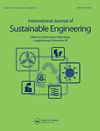Investigating the effects of reactant gas flow geometrical shape on the performance of solid oxide fuel cell
IF 3.6
Q3 GREEN & SUSTAINABLE SCIENCE & TECHNOLOGY
International Journal of Sustainable Engineering
Pub Date : 2022-11-29
DOI:10.1080/19397038.2022.2150936
引用次数: 4
Abstract
ABSTRACT Solid oxide fuel cells powered by renewable fuels will be a panacea for our current challenges to meet the global energy demand and mitigate climate changes stemming from the widespread use of carbon-rich fuels. Accordingly, this numerical investigation has examined the geometrical shape effects of reactant gas ducts, and the thickness of electrodes on solid oxide fuel cell performance. The model was also validated using the experimental result of a rectangular shape gas flow duct conducted at Dr. T. Nejat Veziroğlu Clean Energy Research Center of Niğde Ömer Halisdemir University in Türkiye. Thus, the finding of this work disclosed that the semicircular gas flow duct has outstanding performance following rectangular, trapezoidal and triangular geometrical shapes. The additional remarkable results of this work are that the shape of the reactant gas flow channel and the thickness of the cathode have more substantial effects on airflow than fuel flow under identical electrolyte thickness. The finding also revealed that a peak power density has been achieved when the thickness of an anode gets thicker up to a certain limit then it is sharply decreasing. On the contrary, the performance of the model is increasing as the thickness of the air electrode is increasing. 9 Solid oxide fuel cells powered by renewable fuels panacea for our current challenges to meet the global energy demand and mitigate climate changes stemming from the widespread use of carbon-rich fuels rectangular shape gas flow duct conducted at Dr. T. Nejat VeziroğluNiğdeHalisdemir peak power density has been achieved when the thickness of an anode gets thicker up to a certain limitis decreasingincreasing.研究了反应物气流几何形状对固体氧化物燃料电池性能的影响
摘要:由可再生燃料驱动的固体氧化物燃料电池将是应对当前挑战的灵丹妙药,以满足全球能源需求,缓解因广泛使用富含碳燃料而引发的气候变化。因此,本数值研究考察了反应气体管道的几何形状和电极厚度对固体氧化物燃料电池性能的影响。该模型还使用土耳其NiğdeÖmer Halisdemir大学T.Nejat Veziroğlu博士清洁能源研究中心进行的矩形气流管道的实验结果进行了验证。因此,本工作的发现揭示了半圆形气流通道具有矩形、梯形和三角形几何形状的优异性能。这项工作的额外显著结果是,在相同的电解质厚度下,反应气体流道的形状和阴极的厚度对气流的影响比燃料流的影响更大。这一发现还表明,当阳极的厚度变厚到一定限度时,就会达到峰值功率密度,然后急剧下降。相反,模型的性能随着空气电极厚度的增加而增加。9由可再生燃料驱动的固体氧化物燃料电池是解决我们当前挑战的灵丹妙药,以满足全球能源需求并缓解气候变化,这些挑战源于T博士进行的富含碳燃料矩形气流管道的广泛使用。当阳极的厚度变厚到一定限度时,Nejat VeziroğluNiğdeHalisdemir峰值功率密度已经达到。
本文章由计算机程序翻译,如有差异,请以英文原文为准。
求助全文
约1分钟内获得全文
求助全文
来源期刊

International Journal of Sustainable Engineering
GREEN & SUSTAINABLE SCIENCE & TECHNOLOGY-
CiteScore
7.70
自引率
0.00%
发文量
19
 求助内容:
求助内容: 应助结果提醒方式:
应助结果提醒方式:


